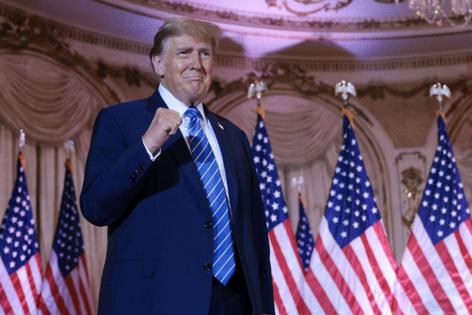Conor Sen: Trump inherits an economy at a tricky time
Published in Op Eds
Donald Trump will inherit, to all appearances, a solid economy when he assumes the presidency in January. After all, the stock market is at record highs, unemployment is low by historical standards and gross domestic product has been expanding at a healthy pace of around 2.5% so far this year.
Yet there’s a reason for voter dissatisfaction with the economy and, beneath the surface, there are several risks for Trump 2.0 as he thinks about enacting his trade and fiscal agenda.
Let’s start with jobs. Trump took over a stable labor market in 2017, with the unemployment rate falling throughout the previous year and payroll growth steady at roughly 200,000 a month. That’s not true this time around: The jobless rate has been on the rise, hiring is below normal and payroll growth has cooled since the first quarter.
The three-month average for private payrolls additions at 78,000 from June to August was the slowest since 2010 outside of the pandemic period. (The September number is still subject to revision and October was heavily affected by a strike and hurricanes). The level of job openings relative to the size of the workforce has fallen back to pre-COVID levels and continues to decline. While the deterioration in the labor market has been gradual, Trump’s team will need to reverse this negative momentum quickly if he wants to sustain the economic expansion and hold on to his electoral gains in the 2026 midterm elections.
This may prove tricky if Elon Musk, the world’s richest man, takes charge of an efficiency commission tasked with slashing government spending. Government jobs have accounted for about 22% of all U.S. employment creation so far this year. Since October 2022, the economy has added 1.1 million government jobs, the fastest two-year pace since the 1960s. And that’s just one part of the Biden job-creation engine that’s now at risk.
The other part has been employment generated by a boom in cleantech and other manufacturing investment that benefited from government grants, loans and subsidies. Think of the construction workers who built the $7.6 billion Hyundai Motor Co. facility in Georgia that’s now rolling out electric vehicles, or the workers who built the Taiwan Semiconductor Manufacturing Co. facility in Arizona.
What now becomes of the infrastructure, manufacturing and clean energy spending that received explicit or implicit support during the Biden administration?
Government spending has added an average of 0.7% per quarter to real GDP growth over the past two years. Private spending on manufacturing construction has surged, too. It’s hard to quantify all the investment dollars drawn in by Biden’s signature policies — the Infrastructure Investment and Jobs Act, the Inflation Reduction Act and the Chips and Science Act — but my Bloomberg Opinion colleagues counted more than $200 billion in planned cleantech manufacturing alone. And even before a dollar of committed spending is cut, the stated goal of the new administration to end subsidies that encourage an energy transition creates an incredible amount of uncertainty for companies thinking about future investment and hiring.
Notably, there were no Obama infrastructure and manufacturing programs that Trump focused on unwinding in 2017. The future of Biden’s signature programs and the economic impact of winding down some of them might be the biggest risk to the expansion heading into the 2026 midterms.
Finally, Trump’s fiscal agenda is in tension with the all-important housing market. Mortgage rates have risen from around 6% in mid-September to 7.13% the day after the election, partly as investors priced in the impact of Trump’s spending plans on inflation and interest rates.
That’s going to strain an already-challenged housing market. If Trump’s planned tax cuts and import tariffs end up fanning inflation and driving up borrowing costs for would-be homebuyers, there’s every chance housing transactions will fall further and home builders will put new construction on hold.
Trump’s ideas on tariffs and immigration restrictions may be what voters want, but they represent a risk to the economy next year at a time when consumers are feeling the sting of high borrowing costs and important aspects of the economy are cooling.
It’s possible all of this works out fine — Trump is famously unpredictable when it comes to his promises, and we don’t know exactly what the future holds for Biden’s programs, or for Trump’s proposed tariffs or tax cuts. What is clear for now is that Trump is inheriting an economy that isn’t easy to manage — and his campaign promises may only make things harder.
_____
This column does not necessarily reflect the opinion of the editorial board or Bloomberg LP and its owners.
Conor Sen is a Bloomberg Opinion columnist. He is founder of Peachtree Creek Investments.
_____
©2024 Bloomberg L.P. Visit bloomberg.com/opinion. Distributed by Tribune Content Agency, LLC.




























































Comments